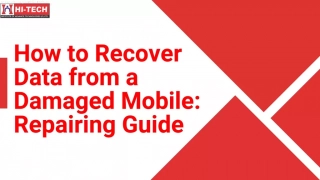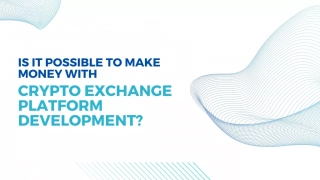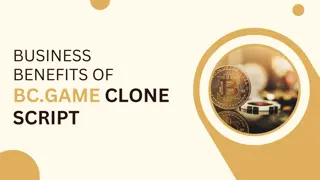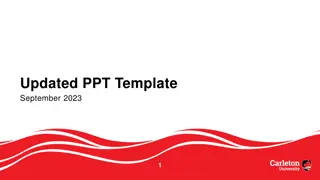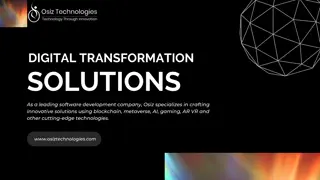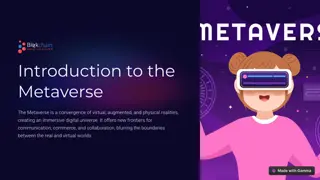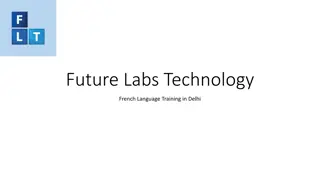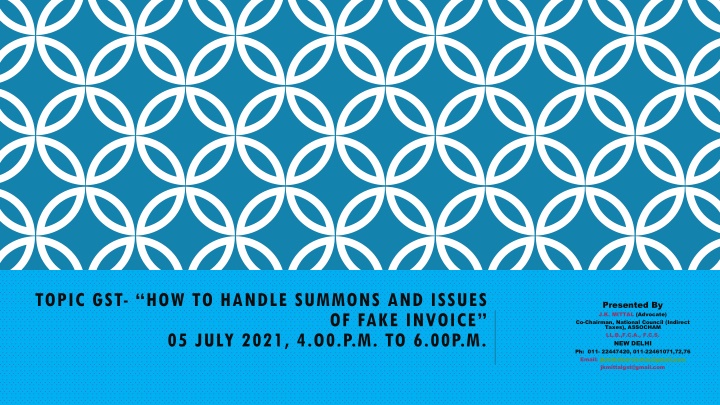
Handling Summons and Issues by J.K. Mittal: A Comprehensive Guide
Learn how to effectively handle summons and issues related to GST presented by J.K. Mittal, an advocate and Co-Chairman at ASSOCHAM. This guide covers the power to summon individuals, produce documents, and provides insights into dealing with legal inquiries.
Download Presentation

Please find below an Image/Link to download the presentation.
The content on the website is provided AS IS for your information and personal use only. It may not be sold, licensed, or shared on other websites without obtaining consent from the author. If you encounter any issues during the download, it is possible that the publisher has removed the file from their server.
You are allowed to download the files provided on this website for personal or commercial use, subject to the condition that they are used lawfully. All files are the property of their respective owners.
The content on the website is provided AS IS for your information and personal use only. It may not be sold, licensed, or shared on other websites without obtaining consent from the author.
E N D
Presentation Transcript
TOPIC GST- HOW TO HANDLE SUMMONS AND ISSUES Presented By J.K. MITTAL (Advocate) Co-Chairman, National Council (Indirect Taxes), ASSOCHAM LL.B.,F.C.A., F.C.S. NEW DELHI Ph: 011- 22447420, 011-22461071,72,76 Email: jkmittalservicetax@gmail.com jkmittalgst@gmail.com OF FAKE INVOICE 05 JULY 2021, 4.O0.P.M. TO 6.00P.M.
Presented By J.K. MITTAL (Advocate) Co-Chairman, National Council (Indirect Taxes), ASSOCHAM LL.B.,F.C.A., F.C.S. NEW DELHI Ph: 011- 22447420, 011-22461071,72,76 Email: jkmittalservicetax@gmail.com jkmittalgst@gmail.com
POWER TO SUMMON PERSONS TO GIVE EVIDENCE AND PRODUCE DOCUMENTS. Section 70. Power to summon persons to give evidence and produce documents. (1) The proper officer under this Act shall have power to summon any person whose attendance he considers necessary either to give evidence or to produce a document or any other thing in any inquiry in the same manner, as provided in the case of a civil court under the provisions of the Code of Civil Procedure, 1908 (5 of 1908). (2) Every such inquiry referred to in sub-section (1) shall be deemed to be a judicial proceedings within the meaning of section 193 and section 228 of the Indian Penal Code (45 of 1860). . See Circular No. 3/3/2017, dated 5-7-2017 [Superintendent of Central Tax].
UNDER CENTRAL EXCISE ACT, 1944 Section 14. Power to summon persons to give evidence and produce documents in inquiries under this Act. (1) Any Central Excise Officer duly empowered by the Central Government in this behalf, shall have power to summon any person whose attendance he considers necessary either to give evidence or to produce a document or any other thing in any inquiry which such officer is making for any of the purposes of this Act. A summons to produce documents or other things may be for the production of certain specified documents or things or for the production of all documents or things of a certain description in the possession or under the control of the person summoned. (2) All persons so summoned shall be bound to attend, either in person or by an authorised agent, as such officer may direct; and all persons so summoned shall be bound to state the truth upon any subject respecting which they are examined or make statements and to produce such documents and other things as may be required: Provided that the exemptions under sections 132 and 133 of the Code of Civil Procedure, 1908 (5 of 1908) shall be applicable to requisitions for attendance under this section. (3) Every such inquiry as aforesaid shall be deemed to be a judicialproceeding within the meaning of section 193 and section 228 of the Indian Penal Code, 1860 (45 of 1860). Officers empowered not below the rank of Superintendent of Central Excise vide Notification No. 9/99-CE (N.T.), dated 10-2-1999. .
WHETHER POWER TO ISSUANCE OF SUMMONS IS UNBRIDLED?. NO Section 70. Power to summon persons to give evidence and produce documents. (1) The proper officerunder this Act shall have power to summon any person whose attendance he considers necessary either to give evidence or to produce a document or any other thing in any inquiry in the same manner, as provided in the case of a civil court under the provisions of the Code of Civil Procedure, 1908 (5 of 1908). Issues: Who can issue summons? Whether power to summons itself is power of conducting inquiry What are the circumstances when summons can be issued? Who is the proper officer for empowering to issue summons?
RECENT SUPRE COURT JUDGMENT THE PROPER OFFICER (I) Whether notification/circular issued under section 2(91) [definition of proper officer] is ill founded in law? (II) Whether the proper officer means, once the officer of jurisdiction exercise power, can it be exercised again by DGGI/DGGSTI? Supreme Court judgments Canon India (P.) Ltd vs Commissioner of Customs 2021 (376) ELT 3 (SC) 19 ..the notification appears to be ill-founded. The notification is purported to have been issued in exercise of powers under sub-Section (34) of Section 2 of the Customs Act. This section does not confer any powers on any authority to entrust any functions to officers. The sub-Section is part of the definitions clause of the Act, it merely defines a proper officer,
SCN - ADJUDICATING ISSUES, RECENT SC JUDGMENT CANON INDIA (P.) LTD VS COMMISSIONER OF CUSTOMS 2021 (376) ELT 3 (SC) the Supreme Court held that 12 The power has been so conferred specifically on the proper officer which must necessarily mean the proper officer who, in the first instance, assessed and cleared the goods i.e. the Deputy Commissioner Appraisal Group. Indeed, this must be so because no fiscal statute has been shown to us where the power to re-open assessment or recover duties which have escaped assessment has been conferred on an officer other than the officer of the rank of the officer who initially took the decision to assess the goods. 13. Where the statute confers the same power to perform an act on different officers, as in this case, the two officers, especially when they belong to different departments, cannot exercise their powers in the same case. Where one officer has exercised his powers of assessment, the power to order re-assessment must also be exercised by the same officer or his successor and not by another officer of another department though he is designated to be an officer of the same rank. In our view, this would result into an anarchical and unruly operation of a statute which is not contemplated by any canon of construction of statute. 14. It is well known that when a statute directs that the things be done in a certain way, it must be done in that way alone. As in this case, when the statute directs that the proper officer can determine duty not levied/not paid, it does not mean any proper officer but that proper officer alone. We find it completely impermissible to allow an officer, who has not passed the original order of assessment, to re-open the assessment on the grounds that the duty was not paid/not levied, by the original officer who had decided to clear the goods and who was competent and authorised to make the assessment. ...
SUMMONS CANNOT BE ISSUED TO DO SOME ACT INDIRECTLY WHICH IS NOT PERMITTED DIRECTELY. In Magma Sharchi Finance Ltd. v/s Commissioner of Service Tax Kolkata, 2017 (6) GSTL 238 (Cal.), it was held that 26 The adjudicating authority cannot be directed to fish out evidence. The Central Excise Intelligence and Investigation Manual require the SCN to be issued only after proper inquiry/investigation i.e., when the facts used are ascertained and allegations justified. The other particulars in the said Manual relied upon by the appellant also assume significance. The adjudicating authority is to adjudicate on the demand in the SCN based on the allegations made therein. High Court Judgment (C) A full Bench of Hon ble Delhi High Court in the case of CIT v Kelvinator of India Ltd. (2002)256 ITR 1 (Del.) after approving Jindal Photo Films Ltd. v Deputy CIT (1998) 234 ITR 170 (Del.)had held that It is a well-settled principle of law that what cannot be done directly cannot be done indirectly. If the Income-tax Officer does not possess the power of review, he cannot be permitted to achieve the said object by taking recourse to initiating a proceeding of reassessment or by way of rectification of mistake. In a case of this nature the Revenue is not without remedy. Section 263 of the Act empowers the Commissioner to review an order which is prejudicial to the Revenue. The said judgment is approved by the Supreme Court CIT v Kelvinator of India Ltd. (2010) 2 SCC 723.
ESSENTIALS OF ISSUING SUMMONS any provisions of law of such purported inquiry; said officer under the said law, is competent to conduct said inquiry; inquiry must exist/ precede issuance of summons; section 70 itself cannot be ignition point of inquiry; Section 70(1) is like a machinery provisions which is for collection of evidence in an inquiry , therefore, it cannot be read as substantive provisions to conduct an inquiry; whose attendance he considers necessary What are significance of these words? in the same manner, as provided in the case of a civil court under the provisions of CPC, 1908. As per CPC- Every summons shall be accompanied by a copy of the plaint or, if so permitted, by a concise statement .
ESSENTIALS OF ISSUING SUMMONS CONSIDER NECESSARY considers it necessary postulate due application of the mind is sine qua non In Barium Chemicals Ltd. v. A.J. Rana, (1972) 1 SCC 240 at page 246 14. The words considers it necessary postulate that the authority concerned has thought over the matter deliberately and with care and it has been found necessary as a result of such thinking to pass the order.
ESSENTIALS OF ISSUING SUMMONS CONSIDER NECESSARY In I.J. Rao, Assistant Collector v. Bibhuti Bhushan Bagh 1989 (42) E.L.T. 338 (S.C.), 13. There is no doubt that the words on sufficient cause being shown in the proviso to Section 110(2) of the Act indicates that the Collector of Customs must apply his mind to the point whether a case for extending the period of six months is made out. What is envisaged is an objective consideration of the case and a decision to be rendered after considering the material placed before him to justify the request for extension.
REASON TO BELIEVE IS A SINE QUA NON FOR TAKING ACTION SERACH/ ARREST ETC.. J. Sekar v UOI 2018 (361) E.L.T. 689 (Del.); 2018 SCC OnLine Del. 6523 72. formed by someone else. The officer who is supposed to write down his reasons to believe has to independently apply his mind. Further, and more importantly, it cannot be a mechanical reproduction of the words in the statute. When an authority judicially reviewing such a decision peruses such reasons to believe, it must be apparent to the reviewing authority that the officer penning the reasons has applied his mind to the materials available on record and has, on that basis, arrived at his reasons to believe. The process of thinking of the officer must be discernible. The reasons have to be made explicit. It is only the reasons that can enable the reviewing authority to discern how the officer formed his reasons to believe. Reasons to believe cannot be a rubber stamping of the opinion already
WHETHER POWER TO ISSUANCE OF SUMMONS IS UNBRIDLED?. NO Decisions: In Menka Gambhir v UOI AND ORS. 2020 SCC OnLine Cal 995 : (2020) 373 ELT 604 : (2020) 2 Cal LT 158, while considering the section 108 of the Customs Act, 1962 for issuance of summons, held that: 30. Thus the necessary elements of a valid summons under Section 108 are: (a) a gazetted officer must conduct the inquiry himself; (b) the same officer must consider the attendance of the summoned necessary; and (c) the attendance must be before the same officer.
THE POWER OF INQUIRY DERIVED ONLY FROM SUBSTANTIVE PROVISIONS OF LAW under CGST Act, there are specific provisions have been made under which officer can exercise the power and for exercise of such powers specific FORM have been designed under the CGST Rules, 2017 on which communication shall be paid with the taxpayers and such provisions have provided certain safeguard/ reasons which such power can be exercise by the officers
LIMITATION UNDER SUMMONS Whether officer while recording Statement can he asked any questions of law or interpretation of law and agreement? No. Whether by issuing summons can an officer ask to give legal grounds ? No. Whether by issuing summons can an officer ask to prepare details ? No. includes , (i) details of services provided , (ii) details of amount collected , (iii) grounds for claiming services as export of services , etc. , EBIZ.com Pvt. Ltd. v UOI, 2016 (338) ELT 562 (Del.) wherein when the Court asked the Revenue Department/ DGCEI to point out the provision under which an assessee could be ordered to create documents, the Revenue Department could not point out any provision. it was held that: 5 .However, the DGCEI appears to have not accepted the said documents and returned them to the Petitioner insisting that the Petitioner should now give the information in a particular format. When asked to point out whether there was any provision in the law whereby an Assessee could be ordered to create documents which were not in its possession, Mr. Satish Aggarwala, learned counsel for the Respondents 2 and 3 was unable to point out any such provision The aforesaid matter, final judgment delivered on 01.09.2016, reported in eBiz.Com Pvt. Ltd v UOI reported in 2016 (44) STR 526 (Del.) wherein para 77 also dealt with the above subject matter.
OFFICERS - DUTY CONSCIOUS RATHER THAN POWER CHARGED Mahesh Chandra v Regional Manager, U.P. Financial Corporation, (1993) 2 SCC 279 categorically observed that wherever wide power is conferred by statutes on public functionaries, the same is subject to inherent limitation that it must be exercised in just, fair and reasonable manner, bona fide and in good faith; otherwise, it would be arbitrary. In such cases, test of reasonableness is stricter. The Supreme Court held that The public functionaries should be duty conscious rather than power charged. In para 15 of said judgment state that An action is mala fide if it is contrary to the purpose for which it was authorised to be exercised. Dishonesty in discharge of duty vitiates the action without anything more. An action is bad even without proof of motive of dishonesty, if the authority is found to have acted contrary to reason.
MANDATORY TO MENTION THE DOCUMENT IDENTIFICATION NUMBER (DIN) FOR ALL COMMUNICATIONS SENT BY ITS OFFICES TO TAXPAYERS Circular No. 122/41/2019-GST, dated 5-11-2019 read with Circular No. 128/47/2019- GST, dated 23-12-2019 issued by the Central Board of indirect taxes and custom which make it mandatory to mention the Document Identification Number (DIN) for all communications sent by its offices to taxpayers. In para 10 of the said circular, it is stated that It is reiterated that any specified document that is issued without the electronically generated DIN shall be treated as invalid and shall be deemed to have never been issued. The Circulars have made it clear that Document Identification Number (DIN) shall be done in respect of all communications (including e-mails) sent to taxpayers and other concerned persons by any office of the Central Board of Indirect Taxes and Customs (CBIC) across the country. There is a settled law that if the law has prescribed the things that have to be done in a particular manner, the same has to be done only in the manner prescribed or not to be done at all.[CIT v. Pearl Mech. Engg. & Foundry Works (P) Ltd., (2004) 4 SCC 597, at page 605]
DGCEI IS NOW DGGSTI/ DGGI DG, GST Intelligence (DGGSTI) is a specified wing of Department of Revenue, Ministry of Finance, which acts on specific Information of tax evasion and not for the purpose of making general enquiry regarding payment of GST. inquiry regarding payment of GST , which is only a general inquiry. roving inquiry is beyond the objectives of DGCEI.
CAN A SUMMONS ISSUED BY DGGI/ GST OFFICER CAN BE CHALLANGED IN COURT YES. National Building Construction Co. Ltd. v UOI 2019 (20) G.S.T.L. 515 (Del.), 29. of the CE Act can be issued without any cause, reason or justification. Any power given cannot be abused and exercised in an arbitrary manner or for ulterior motives. Motivated and capricious deviations in exercise of power under Section 14 of the CE Act can always be checked by the Court. We should not be understood as accepting or stating that notice or summons under Section 14
SUMMONS ISSUED BY THE CENTRAL TAX AUTHORITIES HIGH COURT GRANTED STAY WHETHER CENTRE ASSESSEE? AND STATE BOTH CAN EXERCISE JURISDICTION OVER NO. in WP (C) No 5040/2021 in the matter of M/s. Koenig Solutions Pvt. Ltd Vs. Union of India & Ors order 28.04.2021 Delhi high court granted stay. Section 6(2)(b) where a proper officer under the State Goods and Services Tax Act or the Union Territory Goods and Services Tax Act has initiated any proceedings on a subject matter, no proceedings shall be initiated by the proper officer under thisAct on the same subject matter. Decision 1. The Delhi High Court by order 28.04.2021 has stayed the proceedings initiated by the Central Tax Officers against the Petitioner company whose jurisdiction has been assigned to the State Tax officer, Delhi, who have also exercised the jurisdiction. The High Court also recorded the submission of bar under section 6(2)(b) of the Central Tax Officer. 2. The High Court, while granting the stay, has found that prima facie there is lack of jurisdiction by the Central Tax officer. 3. The High Court also took cognizance of the fact that summons have been issued by using the language that Petitioner representative should not leave the office without completion of the inquiry or without leave permissions of the officer or till the inquiry/ case is adjourned, which is contrary to the format for the summons prescribed by the Central Government.
SUMMONS ISSUED BY THE STATE TAX AUTHORITIES HIGH COURT GRANTED STAY WHETHER CENTRE AND STATE BOTH CAN EXERCISE JURISDICTION OVER ASSESSEE? NO. In W.P.A. 1629 OF 2021 Raj Metal Industries & Anr. V Union of India & Ors. order 24.03.2021 CALCUTTA high court granted stay. Decision 1. In W.P.A. 1629 OF 2021 Raj Metal Industries & Anr. V Union of India & Ors. inter alia challenge the actions initiated by the State GST authorities with respect to summons issued on October 19, 2020. It was submitted that the proceedings were pending under the CGST Act and therefore, no proceedings could have been initiated by the State GST, by relying on Sub-Section 2(b) of Section 6 of the West Bengal GST Act. The High Court by order dated 24.3.2021 held that I am of the view that the summons that have been issued on October 19, 2020 by the State GST is, prima facie, in violation of Section 6(2)(b) of the WBGST Act. Accordingly, I direct stay of the above summons and any proceedings thereunder.
SUMMONS USES HARASS LANGUAGE TO INSTILL FEAR AMONG TAXPAYERS In WP (C) No 5040/2021 in the matter of M/s. Koenig Solutions Pvt. Ltd Vs. Union of India & Ors order 28.04.2021 Delhi high court granted stay. 6. According to Mr. Mittal, the concerned officer appears to be acting in a high-handed fashion, inasmuch as, in the impugned summons, it is stated that the authorised representative of the petitioner is not to leave the office of the officer concerned without his permission. 6.1 For the sake of convenience, the exact words used in the impugned summons are set forth hereafter [Page 71 of the electronic paper book]: You would not leave the office without completion of the inquiry or without my permission or till the inquiry/ case is adjourned 7. It is further contended by Mr. Mittal that the impugned summon has been issued without application of mind as it adverts to the provisions of the statute, which have no relevance to the CGST Act, 2017. The Board through instruction F. No. 137/39/2007-CX-4, dated 26-2-2007 - Subject : Issuance of summons in service tax matters-regarding: The harsh and legal language of the summons not only causes unnecessary metal stress & embarrassment and instills fear in the minds of the receiver but may also become a source of harassment or even unethical practices. Board has taken a serious note of this practice.
SUMMONS ISSUED BY THE CENTRAL TAX AUTHORITIES HIGH COURT DID NOT INTERFERE Decisions: JSK MARKETING LTD. V UOI 2021 (46) GSTL 369 (BOM.) JUDGMENT DATED 16.02.2021 In this case, challenge is made to the issuance of summons. The High court after considering the provisions of section 14 of the Central Excise Act, 1994 as applicable to service tax, and section 70 of the CGST Act, 2017 and Section 174 of the CGST Act, 2017, the Court held thus: 9.. Thus it is evident that respondent No.2 has power and authority to issue summons to the petitioners and more specifically petitioner No.2 under the provisions of the aforementioned statutes to give evidence and produce the relevant documents in inquiry. Remarks: The judgment has not discussed, that power to issue summons is with the which rank of officer, and in what circumstances, and summons does not empower them to make inquiry, but in any inquiry summons can be issued, and not vice versa. Further, summons could be issued by an officer who is empower to conduct inquiry, therefore, provisions have to be found in the Act, to conduct inquiry and saving clause, has very limited scope.
WHETHER FRESH PROCEEDINGS UNDER THE REPEALED ACT JUSTIFIED UNDER SAVING CLAUSE?. NO Decision: Sahitya Mudranalaya Private ... vs Additional Director General 2021 (46) GSTL 245 (Guj.) in judgment dated 29.01.2020 7.8 Thus, clause (e) of sub-section (2) of section 174 of the CGST Act provides for institution of investigation, inquiry, verification, assessment proceedings, adjudication and other legal proceedings as if the Finance Act, 1994 has not been so amended. Therefore, even after the omission of Chapter V of the Finance Act, 1994, by virtue of clause (e) of sub-section (2) of section 174 of the CGST Act, the authority is authorised to institute any legal proceeding under the said Act. The contention that the authority does not have authority to initiate fresh proceedings after the omission of Chapter V of the Finance Act, therefore, does not merit acceptance. Remarks: This judgment need revisit, (1) Section 174(2) start with the words shall not and therefore, clause (e) cannot be read as shallinstitute . (2) section 174 is only a saving clause and therefore does and could not empower the officer, unless the power itself was granted under the repealed statute.
WHETHER FRESH PROCEEDINGS UNDER THE REPEALED ACT JUSTIFIED UNDER SAVING CLAUSE?. NO Section 174(2)- (2) The repeal of the said Acts and the amendment of the Finance Act, 1994 (32 of 1994)(hereafter referred to as suchamendment or amendedAct , as the case may be) to the extent mentioned in the sub-section (1) or Section 173 shall not XXXX (e) affect any investigation, inquiry, verification (including scrutiny and audit), assessment proceedings, adjudication and any other legal proceedings or recovery of arrears or remedy in respect of any such duty, tax, surcharge, penalty, fine, interest, right, privilege, obligation, liability, forfeiture or punishment, as aforesaid, and any such investigation, inquiry, verification (including scrutiny and audit), assessment proceedings, adjudication and other legal proceedings or recovery of arrears or remedy may be instituted, continued or enforced, and any such tax, surcharge, penalty, fine, interest, forfeiture or punishment may be levied or imposed as if these Acts had not been so amended or repealed;
WHETHER FRESH PROCEEDINGS UNDER THE REPEALED ACT JUSTIFIED UNDER SAVING CLAUSE?. NO Decision: in following cases stay granted by High court on the notices issued for conducted audit/ verification etc., under service tax after introduction of GST. 1. M/s. T.R. Sawahney Motors Pvt. Ltd. v UOI & Anr. 2019 (24) G.S.T.L. 176 (Del.) order dated 11.03.2019 passed by the Hon ble Delhi High Court in WP (C).2138/2019. 2. M/s. Services International Ltd. v. Union of India, order dated 12.03.2019 passed by the Hon ble Delhi High Court in WP (C).2479/2019. 3. Sulabh International Social Service Organisation v. Union of India, 2019 SCC Online Jhar 339;2019 (25) G.S.T.L. 28 (Jhar.) 4. M/s OWS Warehouse Services LLP v UOI 2018 (19) GSTL 27 (Guj.), order dated 17.10.2018 passed by the Hon ble Gujarat High Court in SCA.No.16226/2018. 5. Magma Housing Finance Ltd. v. Union of India & Others, order dated 19.02.2020 passed by the Hon ble Calcutta High Court in W.P.No.11919 (W) of 2019. 6. Magma ITL Finance Ltd. v. Union of India & Others, order dated 19.02.2020 passed by the Hon ble Calcutta High Court in W.P.No.11920 (W) of 2019. 7. Mfar Developers Private Limited v Union of India & Others WP.No.9566/2019 by order dated 07.03.2019 which is upheld in W.A.No.3770/2019 (T-RES) by order dated 05.01.2021.
GST what should be objective to replace earlier law? Any new law replacing the earlier laws in taxation essentially should have two unique features namely (1) to reduce litigations; (2) to plug the loopholes for evasion of taxes thereby enhance the tax buoyancy. As on date what is experienced in last 3 years. it has neither reduced litigations and not plug the loopholes for evasion of taxes. In fact, there is a surge in litigations across country many on account of problem faced by the taxpayers due to poor performance of GSTN network/GSTN portal and many others on account of repetitive amendments by the delegated legislation, law become more complex and denying the input tax credits and other benefit under GST is norms
GST Circular trading and fake invoices has become buzzword? GST litigation is getting momentum. Under GST, Circular trading and fake invoices has become buzzword. GST Department across country have booked large number of cases on the allegation of circular trading and fake invoices and large number of people have been arrested which includes many professionals also in the alleged racket of fake invoices. In the process, the Department also alleged that there was no supply of goods in these transactions and therefore input tax credit has been wrongly availed
GST is an impetus to the alleged transactions of circular trading or fake invoices? The litigation on account of alleged circular trading and fake invoices was unheard before the introduction of GST. Now, therefore, the question arises - whether with the introduction of the GST, there is an impetus to the alleged transactions of circular trading or fake invoices? And if such kind of transaction were already in place then - why the GST has not taken care to curb on such transaction? On the contrary, it appears that with the introduction of GST, there is surge in such kind of transactions, which has led to the booking of thousands of cases across country by the GST Department on alleged transaction of circular trading and fake invoices. Analogous question may arise - are these cases have been booked on false allegations of transactions of circular trading or fake invoices? Which are most likely to be, as per factual matrix and the legal provisions under GST, as discussed hereunder.
GST Circular Trading: is it banned under GST ? In simplest way it can be defined as when supply of goods or transaction of goods, take place among the few taxpayers, it is called as circular trading. For instance, firm A supply the goods to firm B, and firm B supply goods to firm C, and firm C supply goods to firm D, and so on . and by the last transactions, goods is supplied to firm A. Now the question arises, even if such transactions take place, is it illegal? Or is it banned under the law? All such transactions by itself lead to any evasion of tax? If answer to these questions is in negative then how the taxpayer could be booked for alleged circular trading. The circular trading referred by the Department is the term coined by themselves, it could have relevancy only if transactions are made without payment of GST to evade taxes.
GST Circular Trading: How transactions take place, and taxes paid- then why doubt ? Let s see how these transaction take place and reported and then judge the questionability of these transactions. When firm A supply the goods to firm B, a raises an invoice on the firm B with GST, and such GST are paid to the government and proper return (GSTR-1/GSRT-3B) is filed. Similarly, firm B supply goods to firm C, and firm C supply goods to firm D, and so on . And it is told that in most of the cases GST so levied, collected and paid are also reflected in GSTR-2A. There are possibility, in some case, selling dealer, would not have deposited GST, which is discussed in later hereinafter. However, despite all this compliance of the law and there are no apparent irregularities, the departmental officer found fishy and book the cases on the grounds that these are the circular trading. Over and above, the Department officers also alleged that in these transactions, there is no supply of goods.
GST no supply of goods: does it fall under GST ? Do the Department has any legal right to collect even the GST on such transactions alleging there is no supply of goods? Are such transactions are covered within the ambit of GST law? As per section 9 of the CGST Act, 2017, GST is levied on the supply of goods. The tax is collected by the Department from firm A, it never alleged that there is no supply of goods but when on the invoice issued by the firm A, the firm B took input tax credit than in the hands of the firm B, it is alleged that there are not eligible for input tax credit as against that invoice there was no supply of goods. In C.W.T. v Inder Sharma (1997) VI AD (Delhi) 1029, while dealing in the wealth tax matter, Delhi Hihg Court held that if the dwelling unit belongs to the assesse then liable to be included in his net wealth and at the same time liable to taken into consideration for the purpose of exemption . Therefore, GST authority cannot take a plea while collecting the tax that there is a supply of goods and at the same time, while the input credit is taken, for the same very transaction, cannot alleged that there is no supply of goods. Therefore, entire their allegations fall flat in law.
GST Fake Invoices: Is it actuality or imagination? FakeInvoices : While levelling the serious allegation and arresting the persons, GST Department also alleged that the input tax credit have been taken on the fake invoices. The term fake invoices have not been defined in the law. But by common sense one can understand what can construed as fake invoices. A fake invoice could be an invoice which generated & sign by the person other than the person from the invoice belongs to. For instant, if the invoice is of ABCD and company and if that invoices generated by firm X & sign by the person other than the person authorised by ABCD and company, in that case, such invoice would be termed as fake invoice. Whereas, in all such cases, the Department has no such allegation and as such invoices issued by ABCD and company and also signed by the person authorised by the ABCD and company. In such a case no invoice can be construed at fake invoices. It appears that the Department is crying more than the actuality and their entire their allegations fall flat in law.
GST howsoever strong may be the suspicion, it cannot take the place of proof. Krishnand vs. State of Mandharsinghji P. Jadera (2005) 281 ITR 0019, AIR 1977 SC 796, 1977 CriLJ 566, (1977) 1 SCC 816, it is held that 26 It is not enough merely to show circumstances which might create suspicion, because the court cannot decide on the basis of suspicion. It has to act on legal grounds established by evidence. Here, in the present case, no evidence at all was led on the side of the prosecution to show that the monies lying in fixed deposit in Shanti Devi's name were provided by the appellant and howsoever strong may be the suspicion of the court in this connection, it cannot take the place of proof. State(Delhi Administration) Vs. Guljari Lal TondonAIR 1979 SC 1382, 1979 CriLJ 1057, (1979) 3 SCC 316 4 There can be no doubt that the circumstances raise a serious suspicion against the respondent but suspicion however grave it may be, cannot take the place of proof.
GST Reversal of input tax credit and collection of GST multiple times on full value - is it correct ? Surprisingly, when the Department make an allegation against the persons so arrested, the prime objective of the Department appears to be to insist upon to pay the taxes equivalent to the amount of input tax credit availed by them on the transaction alleged to be circular trading by alleging that such input tax credit has been taken on the fake invoices. Therefore, essentially what the Department is putting their case in a manner that while the GST has already been collected from the firm A, while insisting to the firm B, to reverse the input tax credit on the same very invoices issued from the firm A on which the GST has already been collected. This essentially means the firm B has to pay GST on the entire value mentioned in the invoice issued to the firm C, without availing the input tax credit. This would be going against the very concept of the GST which is levied and collected on the value addition. Whereas if there is no supply of goods, they cannot demand the GST from any of the firms, whereas they are demanding GST from each from without allowing them to take into tax credit. This stand of the Department itself is self-contradictory and against the legal provisions.
GST Can input tax credit be denied on the grounds other than those mentioned in the law? the Department many a times, also add newer grounds that the selling dealers could not be found/ traced or not in existence at the address mentioned in the invoice even though selling dealer is registered as per GST portal on that address only. Firstly, is any duty has been cast under the law on the buying dealer about all these things? Answer is no? Therefore, the second question arises whether the GST Department can book a case against the taxpayers on the grounds for denial of input tax credit which is not found in the law. Answer to this question is also in negative as eligibility and non-leviablity of the input tax credit is there in the section 16 whereas the blocked credit provisions are there in section 17. Therefore, the Department cannot make out a case against the assessee to deny the input tax credit on a grounds unfounded in the law.
GST Can input tax credit be denied on the grounds other than those mentioned in the law or physical delivery of goods necessary? As per explanation attached to section 16(2)(b), it is not necessary goods has to be received physically by the dealer, even if goods is delivered to the 3rd party on his direction, it will be sufficient compliance of the requirement. Delivery could be physical or constructive. Bill to ship is a valid transaction therefore allegation of non-physical delivery is unfound in law. High Sea Sale this is valid transaction and no physical deliver take place. Transaction is share/ securities take place without actual deliver.
GST if seller does not pay to the government, can this be legal grounds to deny the input tax credit? Section 16(2)(c) condition for entitlement to take credit- tax charged, actually paid to the credit of Government. once the buyer pays GST to the seller and if the seller does not pay to the government, can this be legal grounds to deny the input tax credit? In On Quest Merchandising India Pvt. Ltd. v Govt. of NCT of Delhi 2018 (10) G.S.T.L. 182 (Del.)- the High Court held that 54. a purchasing dealer who has bona fide entered into a purchase transaction with a registered selling dealer who has issued a tax invoice reflecting the TIN number. In the event that the selling dealer has failed to deposit the tax collected by him from the purchasing dealer, the remedy for the Department would be to proceed against the defaulting selling dealer to recover such tax and not deny the purchasing dealer the ITC .. In Gheru Lal Bal Chand v State of Haryana and Anr. 2011 SCC OnLine P&H 13205 it is held that 33. ..no liability can be fastened on the purchasing registered dealer on account of non-payment of tax by the selling registered dealer in the treasury unless it is fraudulent, or collusion or connivance with the registered selling dealer or its predecessors with the purchasing registered dealer is established..
GST if seller does not pay to the government, can this be legal grounds to deny the input tax credit? Section 16(2)(c) condition for entitlement to take credit- tax charged, actually paid to the credit of Government. once the buyer pays GST to the seller and if the seller does not pay to the government, can this be legal grounds to deny the input tax credit? Judgment dated 24.02.2021 Madras High Court in the matter of W.P.(MD)No.2127 of 2021 M/s. D.Y. Beathel Enterprises v The State Tax Officer. 13 .I am unable to appreciate the approach of the authorities. When it has come out that the seller has collected tax from the purchasing dealers, the omission on the part of the seller to remit the tax in question must have been viewed very seriously and strict action ought to have been initiated against him. The High Court in this directed that seller dealer to be examined and recovery action to be initiated against selling dealer. The High Court held as, 16 .In the said enquiry, Charles and his wife Shanthi will have to be examined as witnesses. Parallely, the respondent will also initiate recovery action against Charles and his wife Shanthi.
GST can a person can be arrested without adjudication of the show cause notice? Vimal Yashwantgiri Goswami v State of Gujarat in R/Special Civil Application No. 13679 of 2019 judgment dated 20/10/2020 held (i) we are of the opinion that the power to arrest as provided under section 69 of the CGST Act can be invoked ..without there being any adjudication for the assessment as provided under the provisions of the Chapter VIII of the CGST Act. (ii) When any person is arrested by the authorised officer, in exercise of his powers under Section 69 of the CGST Act, the authorised officer effecting the arrest is not obliged in law to comply with the provisions of Sections 154 to 157 of the Code of Criminal Procedure, 1973 This does not necessarily mean that a person alleged to have committed a non cognizable and bailable offence cannot be arrested without a warrant issued by the Magistrate. (iii) The authorised officer exercising power to arrest under section 69 of the CGST Act, is not a Police Officer and, therefore, is not obliged in law to register FIR against the person arrested in respect of an offence under Sections 132 of the CGST Act. (iv) Where an authorised Officer arrests a person and informs that person of the grounds of his arrest, for the purposes of holding an inquiry into the infringement of the provisions of the CGST Act which he has reason to believe has taken place, there is no formal accusation of an offence. The accusation could be said to have been made when a complaint is lodged by an officer competent in that behalf before the Magistrate.
GST is Vimal Yashwantgiri Goswami v State of Gujarat in R/Special Civil Application No. 13679 of 2019 judgment dated 20/10/2020, CPC section 4(2) and views of Supreme Court was not noticed. (i) The Constitution Bench of the Supreme Court in A. R. Antulay vs Ramdas Sriniwas Nayak And Another (1984) 2 SCC 500 held that 16 ..In the absence of a specific provision made in the statute indicating that offences will have to be investigated, inquired into, tried and otherwise dealt with according to that statute, the same will have to be investigated, inquired into, tried and otherwise dealt with according to the Code of Criminal Procedure. In other words, Code of Criminal Procedure is the parent statute which provides for investigation, inquiring into and trial of cases by criminal courts of various designations. (ii) Om Prakash v UOI 2011 (272) E.L.T. 321 (S.C.) 18 .the stand taken by Mr. Mohan Parasaran, learned Additional Solicitor General, was that what was required to be considered in the Writ Petitions was whether there is a power to arrest vested in the officers exercising powers under Section 13 of the 1944 Act without issuance of a warrant and whether such power could be exercised only after an FIR/complaint had been lodged under Section 13 of the aforesaid Act. It was also contended that it was necessary to consider further whether criminal prosecution or investigation could be initiated, which could lead to arrest, without final adjudication of a dual liability.
GST arrest on mere suspicious permissible? No. In the criminal law, law came into motion, once the allegation of an offence is made to police, and on the basis of FIR is registered in the Police Station, thus, criminal law come into motion even on suspicious. Whereas under the Indirect Taxes/ GST, law of arrest come into motion, when there is reasons to believe by the officer empower to order for arrest of a person. It is settled principle of law that reason to believe is not synonymous to reason to suspect [see Dr. Partap Singh and another v Director of Enforcement, FERA and others AIR 1985 SC 989 para 10] Sekar v UOI 2018 (361) E.L.T. 689 (Del.); 2018 SCC OnLine Del. 6523 72. be a rubber stamping of the opinion already formed by someone else. The officer who is supposed to write down his reasons to believe has to independently apply his mind. Further, and more importantly, it cannot be a mechanical reproduction of the words in the statute. When an authority judicially reviewing such a decision peruses such reasons to believe, it must be apparent to the reviewing authority that the officer penning the reasons has applied his mind to the materials available on record and has, on that basis, arrived at his reasons to believe. The process of thinking of the officer must be discernible. The reasons have to be made explicit. It is only the reasons that can enable the reviewing authority to discern how the officer formed his reasons to believe. Reasons to believe cannot
GST arrest IS Provisions of Cr.P.C applies? In Arnesh Kumar v/s State of Bihar and another (2014) 8 SCC 273 has observed that Before a Magistrate authorises detention under Section 167, Cr.PC, he has to be first satisfied that the arrest made is legal and in accordance with law and all the constitutional rights of the person arrested is satisfied. If the arrest effected by the police officer does not satisfy the requirements of Section 41 of the Code, Magistrate is duty bound not to authorise his further detention and release the accused. In Adani Enterprises Ltd versus UOI 2019 (368) ELT 781 (BOM.)has observed that 17 The manner in which he would carry an investigation, when he receives an information in respect of a cognizable offence/non-cognizable offence is found to be conspicuously missing in the statutory scheme of Customs Act. The procedure for investigation or its culmination which is to be found in Chapter XII of the Code in respect of cognizable and non-cognizable cases is apparently missing in the special enactment. And the High Court held that 17 In absence of any procedure being prescribed for investigation of such offences under the special enactment, recourse must necessarily be had to sub- section (2) to Section 4. The necessary sequitur is that in case of an offence which is made cognizable under the Customs Act, the procedure contemplated under Section 154 and in case of an offence which is non-cognizable, the procedure under Section 155 would thus become imperative. Sub-section (2) of Section 4 which acts like an exemplar would govern the manner of investigation under the Custom Act by the provisions contained in the Code of Criminal Procedure in absence of any special provision in the Customs Act prescribing the manner of investigation.
GST arrest and reality- what Supreme Court observations In Ishwar Das Moolrajani v UOI 2016 (332) E.L.T. 387 (S.C.), the Supreme Court once found that even after arrest, no criminal proceeding was initiated despite laps of many years, ordered for the CBI investigation, by recorded in para 6 that directions to the Central Bureau of Investigation (C.B.I.) to conduct an investigation against the concerned persons/officials as to why the criminal proceedings were not initiated against the detenue and other concerned persons when he was arrested . In Arnesh Kumar v/s State of Bihar and another (2014) 8 SCC 273 It affects the liberty and freedom of citizens and needs to be exercised with great care and caution. Our experience tells us that it is not exercised with the seriousness it deserves. In many of the cases, detention is authorised in a routine, casual and cavalier manner.
GST concluding remarks The Government cannot be permitted to take dual stand, on the one hand levying and collecting GST on the same very transaction and while input tax credit is taken against the same making allegations that there is no supply of goods. At the same time the Government cannot be permitted to collect the tax (GST) on the same transaction without allowing the input tax credit as it goes against the very concept of GST which is a tax on value addition. In case the tax is permitted to be collected on the entire value of the transaction without allowing the input tax credit in that case it goes against the Article 265 of the Constitution of India, which provides that no tax shall be levied or collected except by authority of law. As of now there is no case come to the notice of the general public where any person has been convicted by the court where the GST officers have arrested persons on the alleged circular trading of fake invoices for disallowing the input tax credit. Let us hope at some stage, the judicial scrutiny of such cases will be taken by the courts to its logical conclusion.
OFFICERS - DUTY CONSCIOUS RATHER THAN POWER CHARGED Mahesh Chandra v Regional Manager, U.P. Financial Corporation, (1993) 2 SCC 279 categorically observed that wherever wide power is conferred by statutes on public functionaries, the same is subject to inherent limitation that it must be exercised in just, fair and reasonable manner, bona fide and in good faith; otherwise, it would be arbitrary. In such cases, test of reasonableness is stricter. The Supreme Court held that The public functionaries should be duty conscious rather than power charged. In para 15 of said judgment state that An action is mala fide if it is contrary to the purpose for which it was authorised to be exercised. Dishonesty in discharge of duty vitiates the action without anything more. An action is bad even without proof of motive of dishonesty, if the authority is found to have acted contrary to reason.
ASSESSMENT UNDER GST ASSESSMENT (Provisions under Chapter XII) OF CGST Act, 2017 59. Self-assessment 60. Provisional assessment 61. Scrutiny of returns 62. Assessment of non-filers of returns 63. Assessment of unregistered persons 64. Summary assessment in certain special cases Assessment Section 2(11) (11) assessment means determination of tax liability under this Act and includes self-assessment, re-assessment, provisional assessment, summary assessment and best judgment assessment;
ADJUDICATING AUTHORITY Section 2(4) adjudicating authority means any authority, appointed or authorised to pass any order or decision under this Act, but does not include the Central Board of Indirect Taxes and Customs, the Revisional Authority, the Authority for Advance Ruling, the Appellate Authority for Advance Ruling, the National Appellate Authority for Advance Ruling, the Appellate Authority, the Appellate Tribunal and the Authority referred to in sub-section (2) of Section 171;
DETERMINATION OF TAX UNDER SECTION 73 73. Determination of tax not paid or short paid or erroneously refunded or input tax credit wrongly availed or utilised for any reason other than fraud or any wilful- misstatement or suppression of facts. (1) Where it appears to the proper officer that any tax has not been paid or short paid or erroneously refunded, or where input tax credit has been wrongly availed or utilised for any reason, other than the reason of fraud or any wilful-misstatement or suppression of facts to evade tax, he shall serve notice on the person chargeable with tax which has not been so paid or which has been so short paid or to whom the refund has erroneously been made, or who has wrongly availed or utilised input tax credit, requiring him to show cause as to why he should not pay the amount specified in the notice along with interest payable thereon under Section 50 and a penalty leviable under the provisions of this Act or the rules made thereunder. (2) The proper officer shall issue the notice under sub-section (1) at least three months prior to the time limit specified in sub-section (10) for issuance of order. xxxx (9) The proper officer shall, after considering the representation, if any, made by person chargeable with tax, determine the amount of tax, interest and a penalty equivalent to ten per cent. of tax or ten thousand rupees, whichever is higher, due from such person and issue an order. (10) The proper officer shall issue the order under sub-section (9) within three years from the due date for furnishing of annual return for the financial year to which the tax not paid or short paid or input tax credit wrongly availed or utilised relates to or within three years from the date of erroneous refund.
DETERMINATION OF TAX UNDER SECTION 74 74. Determination of tax not paid or short paid or erroneously refunded or input tax credit wrongly availed or utilised by reason of fraud or any wilful-misstatement or suppression of facts. (1) Where it appears to the proper officer that any tax has not been paid or short paid or erroneously refunded or where input tax credit has been wrongly availed or utilised by reason of fraud, or any wilful-misstatement or suppression of facts to evade tax, he shall serve notice on the person chargeable with tax which has not been so paid or which has been so short paid or to whom the refund has erroneously been made, or who has wrongly availed or utilised input tax credit, he should not pay the amount specified in the notice along with interest payable thereon under Section 50 and a penalty equivalent to the tax specified in the notice. requiring him to show cause as to why (2) The proper officer shall issue the notice under sub-section (1) at least six (10) for issuance of order. months prior to the time limit specified in sub-section XXXX (9) The proper officer shall, after considering the representation, if any, made by the person chargeable with tax, determine the amount of tax, interest and penalty due from such person and issue an order. (10) The proper officer shall issue the order under sub-section (9) within a period of five years from the due date for furnishing of annual return for the financial year to which the tax not paid or short paid or input tax credit wrongly availed or utilised relates to or within five years from the date of erroneous refund.




